Salesforce has become the backbone of customer relationship management (CRM) for many businesses, offering a powerful platform to manage customer interactions, streamline operations, and drive growth. However, to fully harness the potential of Salesforce, especially as your business scales, you may need to rely on Salesforce Managed Services. Choosing the right provider for these services is crucial, as they will play a significant role in the success of your Salesforce implementation. In this article, we’ll explore key tips and tricks to help you select the best Salesforce Managed Services provider for your business.
Why Choosing the Right Provider Matters
Selecting the right Salesforce Managed Services provider is not just about finding someone to manage your CRM—it’s about partnering with an expert who understands your business, can help you achieve your goals, and ensures that your Salesforce environment is optimized for performance and growth. The right provider can make the difference between a Salesforce implementation that propels your business forward and one that holds it back.
Key Considerations When Choosing a Salesforce Managed Services Provider
1. Industry Expertise
One of the first things to consider is the provider’s industry expertise. Salesforce is a versatile platform, but each industry has its unique challenges, regulations, and best practices. A provider with experience in your industry will be better equipped to tailor Salesforce to meet your specific needs.
For example, if you’re in the healthcare sector, your provider should understand the importance of data security and compliance with regulations such as HIPAA. On the other hand, if you’re in retail, they should be adept at managing large volumes of customer data and integrating Salesforce with other retail systems.
Tip: Look for case studies or client testimonials from businesses in your industry. These can provide valuable insights into the provider’s ability to deliver results in your specific field.
Don’t forget to check out: 10 Must-Know Facts About Salesforce Managed Services
2. Proven Track Record
Experience and a proven track record are essential when choosing a Salesforce Managed Services provider. You want to partner with a provider who has successfully managed and optimized Salesforce environments for other businesses. This track record demonstrates their ability to deliver on their promises and manage complex Salesforce environments effectively.
Tip: Ask potential providers for references from previous clients or to see case studies of their work. This will give you a better understanding of their capabilities and the results they have achieved for other businesses.
3. Comprehensive Service Offering
Salesforce Managed Services can encompass a wide range of activities, from routine maintenance and support to more complex tasks like customization, integration, and strategic guidance. It’s important to choose a provider that offers a comprehensive suite of services tailored to your needs.
Consider whether the provider can handle not just the day-to-day management of your Salesforce environment but also more strategic initiatives, such as:
- Customizing Salesforce to align with your business processes.
- Integrating Salesforce with other business systems.
- Providing ongoing training and support for your team.
- Offering strategic guidance to ensure Salesforce continues to support your business goals.
Tip: Make a list of the specific services you need and compare them with what each provider offers. Ensure that the provider can meet all your needs, both now and as your business grows.
4. Scalability and Flexibility
As your business grows, your Salesforce environment will need to evolve. This could mean adding new features, integrating with additional systems, or scaling up your data capacity. The right Salesforce Managed Services provider should offer scalability and flexibility to accommodate these changes.
Choose a provider who can scale their services as your business expands. They should also be flexible enough to adapt to changes in your business model or objectives, ensuring that your Salesforce environment continues to meet your needs.
Tip: Discuss future growth plans with potential providers. Ask them how they handle scalability and whether they can adapt to changes in your business.
5. Support and Availability
One of the critical aspects of Salesforce Managed Services is support. You need to ensure that the provider you choose offers the level of support your business requires. This includes availability, response times, and the ability to address issues proactively before they impact your business.
Consider whether you need 24/7 support, on-site assistance, or regular system reviews. The right provider should offer a support package that aligns with your business needs and provides peace of mind knowing that help is always available when you need it.
Tip: Ask potential providers about their support offerings. Find out what their response times are, how they handle emergencies, and whether they offer proactive monitoring and maintenance.
6. Customization Capabilities
Every business is unique, and so are its Salesforce requirements. The right Salesforce Managed Services provider should be capable of customizing Salesforce to fit your specific business processes and goals. This might include developing custom applications, creating bespoke workflows, or integrating Salesforce with other business-critical systems.
Tip: Look for a provider who has experience in customization and can demonstrate examples of how they have tailored Salesforce to meet the unique needs of other clients. This will give you confidence that they can do the same for your business.
7. Strategic Guidance
Salesforce Managed Services are not just about keeping the lights on—they’re also about helping your business get the most out of Salesforce. A good provider should offer strategic guidance, helping you to align Salesforce with your business objectives and ensuring that your CRM continues to deliver value as your business grows.
This might involve regular strategy sessions, performance reviews, or recommendations for new features and integrations that could benefit your business.
Tip: Choose a provider who is proactive in offering strategic advice and is committed to helping you achieve your business goals through Salesforce.
Common Pitfalls to Avoid
When choosing a Salesforce Managed Services provider, it’s important to be aware of common pitfalls that businesses often encounter:
- Choosing Based on Price Alone: While cost is an important consideration, it shouldn’t be the only factor in your decision. A provider who offers a low price but lacks expertise or the ability to scale with your business may end up costing you more in the long run.
- Overlooking Cultural Fit: Your Salesforce Managed Services provider will be an extension of your team. It’s important that they align with your company’s culture and values. This ensures smoother collaboration and a more successful partnership.
- Failing to Define Clear Objectives: Before choosing a provider, be clear about what you want to achieve with Salesforce Managed Services. Without clear objectives, it can be difficult to assess whether a provider is the right fit for your business.
![]() Check out another amazing blog here by Aleksandar: A Complete Guide to Integrating Salesforce with ERP Systems
Check out another amazing blog here by Aleksandar: A Complete Guide to Integrating Salesforce with ERP Systems
Choosing the right Salesforce Managed Services provider is a critical decision that can have a significant impact on your business’s success. By considering factors such as industry expertise, a proven track record, comprehensive service offerings, scalability, support, customization capabilities, and strategic guidance, you can find a provider that not only meets your current needs but also helps your business grow.
Remember that the right provider is more than just a service vendor—they’re a strategic partner who will work with you to ensure that Salesforce continues to deliver value to your business. Take the time to evaluate potential providers carefully, ask the right questions, and choose a partner who aligns with your goals and values.
By making an informed choice, you can ensure that your Salesforce environment is well-managed, optimized, and ready to support your business’s growth and success.











